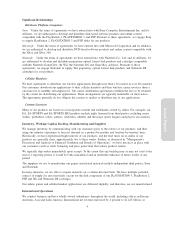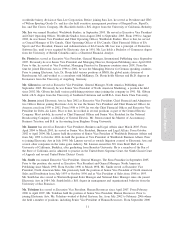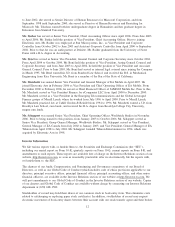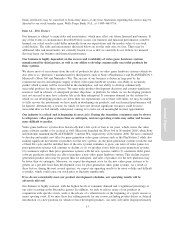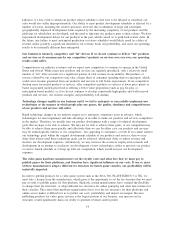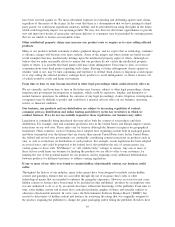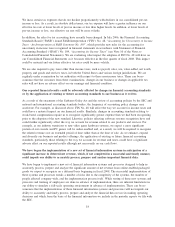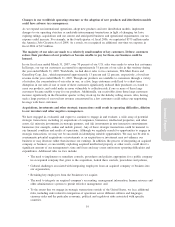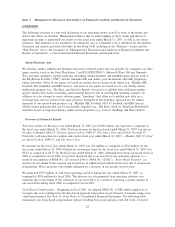Electronic Arts 2007 Annual Report Download - page 92
Download and view the complete annual report
Please find page 92 of the 2007 Electronic Arts annual report below. You can navigate through the pages in the report by either clicking on the pages listed below, or by using the keyword search tool below to find specific information within the annual report.We incur certain tax expenses that do not decline proportionately with declines in our consolidated pre-tax
income or loss. As a result, in absolute dollar terms, our tax expense will have a greater influence on our
effective tax rate at lower levels of pre-tax income or loss than higher levels. In addition, at lower levels of
pre-tax income or loss, our effective tax rate will be more volatile.
In addition, the rules for tax accounting have recently been changed. In July 2006, the Financial Accounting
Standards Board (“FASB”) issued FASB Interpretation (“FIN”) No. 48, “Accounting for Uncertainty in Income
Taxes - An Interpretation of FASB Statement No. 109”, which provides new rules for the accounting for
uncertainty in income taxes recognized in financial statements in accordance with Statement of Financial
Accounting Standard (“SFAS”) No. 109, “Accounting for Income Taxes” (see Note 10 of the Notes to
Consolidated Financial Statements). We are evaluating what impact the adoption of FIN No. 48 will have on
our Consolidated Financial Statements as it becomes effective in the first quarter of fiscal 2008. This impact
could be material and our future effective tax rates could be more volatile.
We are also required to pay taxes other than income taxes, such as payroll, sales, use, value-added, net worth,
property and goods and services taxes, in both the United States and various foreign jurisdictions. We are
regularly under examination by tax authorities with respect to these non-income taxes. There can be no
assurance that the outcomes from these examinations, changes in our business or changes in applicable tax
rules will not have an adverse effect on our earnings and financial condition.
Our reported financial results could be adversely affected by changes in financial accounting standards
or by the application of existing or future accounting standards to our business as it evolves.
As a result of the enactment of the Sarbanes-Oxley Act and the review of accounting policies by the SEC and
national and international accounting standards bodies, the frequency of accounting policy changes may
accelerate. For example, as discussed above, FIN No. 48 will affect the way we account for income taxes and
could have a material impact on our financial results. Similarly, changes in accounting standards relating to
stock-based compensation require us to recognize significantly greater expense than we had been recognizing
prior to the adoption of the new standard. Likewise, policies affecting software revenue recognition have and
could further significantly affect the way we account for revenue related to our products and services. For
example, as our industry transitions to new video game hardware systems, we expect a more significant
portion of our console and PC games will be online-enabled and, as a result, we will be required to recognize
the related revenue over an extended period of time rather than at the time of sale. As we enhance, expand
and diversify our business and product offerings, the application of existing or future financial accounting
standards, particularly those relating to the way we account for revenue and taxes, could have a significant
adverse effect on our reported results although not necessarily on our cash flows.
We have begun the implementation of a new set of financial information systems in anticipation of a
significant increase in deferred net revenue, which, if not completed in a successful and timely manner,
could impede our ability to accurately process, prepare and analyze important financial data.
We have begun to implement a new set of financial information systems and processes designed to help us
accurately process, prepare and analyze the significant amount of net revenue from online-enabled packaged
goods we expect to recognize on a deferred basis beginning in fiscal 2008. The successful implementation of
these systems and processes entails a number of risks due to the complexity of the systems, the number of
people affected company-wide, and the implementation process itself. While testing of these new systems and
processes and training of employees are done in advance of implementation, there are inherent limitations in
our ability to simulate a full-scale operating environment in advance of implementation. There can be no
assurance that the implementation of these financial information systems and processes will not impede our
ability to accurately and timely process, prepare and analyze the financial data we use in making operating
decisions and which form the basis of the financial information we include in the periodic reports we file with
the SEC.
18



